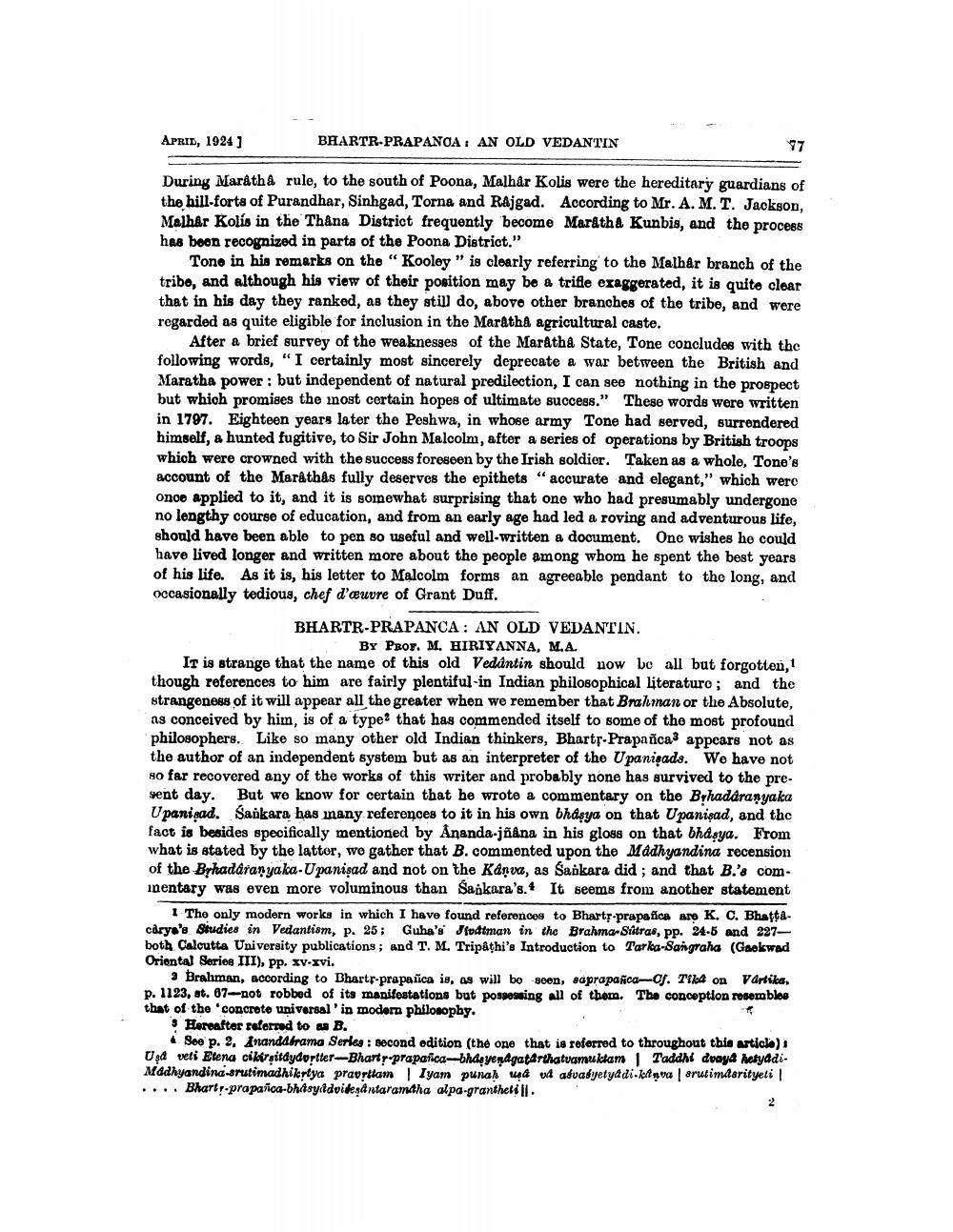________________
APRID, 1924)
BHARTR-PRAPANCA AN OLD VEDANTIN
During Maratha rule, to the south of Poona, Malhår Kolis were the hereditary guardians of the hill-forts of Purandhar, Sinhgad, Torna and Rajgad. According to Mr. A.M.T. Jackson, Malhar Kolís in the Thana District frequently become Marath& Kunbis, and the process has boon recognized in parts of the Poona District."
Tono in his remarks on the "Kooley " is clearly referring to the Malhar branch of the tribo, and although his view of their position may be a trifle exaggerated, it is quite clear that in his day they ranked, as they still do, abovo other branches of the tribe, and were regarded as quite eligible for inclusion in the Maratha agricultural caste.
After a brief survey of the weaknesses of the Maratha State, Tone concludes with the following words, "I certainly most sincerely deprecate a war between the British and Maratha power : but independent of natural predilection, I can see nothing in the prospect but which promises the most certain hopes of ultimate success." These words were written in 1797. Eighteen years later the Peshwa, in whose army Tone had served, surrendered himself, & hunted fugitive, to Sir John Malcolm, after a series of operations by British troops which were crowned with the success foreseen by the Irish soldier. Taken as a whole, Tone's account of the Marathas fully deserves the epithets" accurate and elegant," which were onoe applied to it, and it is somewhat surprising that one who had presumably undergone no lengthy course of education, and from an early age had led a roving and adventurous life, should have been able to pen so useful and well-written a document. Ono wishes he could have lived longer and written more about the people among whom he spent the best years of his life. As it is, his letter to Malcolm forms an agreeable pendant to the long, and occasionally todious, chef d'euvre of Grant Duff.
BHARTR-PRAPANCA : AN OLD VEDANTIN.
BY PROT. M. HIRIYANNA, M.A. It is strange that the name of this old Vedantin should now be all but forgotten, though references to him are fairly plentiful-in Indian philosophical Literaturo; and the strangeness of it will appear all the greater when we remember that Brahman or the Absolute, ns conceived by him, is of a type that has commended itself to some of the most profound philosophers. Like so many other old Indian thinkers, Bhartr-Prapancas appears not as the author of an independent system but as an interpreter of the Upanigads. We have not so far recovered any of the works of this writer and probably none has survived to the present day. But we know for certain that he wrote a commentary on the Brhadaranyaka Upaninad. Sankara has many references to it in his own bhasya on that Upanipad, and the fact is besides specifically mentioned by Ananda-jñana in his gloss on that bhasya. From what is stated by the lattor, we gather that B. commented upon the Madhyandina recension of the Brhadaranyaka-Upanişad and not on the Kanva, as Sankara did; and that B.'s cominentary was even more voluminous than Sankara's. It seems from another statement
1 The only modern works in which I have found references to Bhartp.prapanica sro K, C. Bhattacarya's Studies in Vedantism, p. 25; Guha's Jfodtman in the Brahma-Stitras, pp. 24-5 and 227both Calcutta University publications; and T. M. Tripathi's Introduction to Tarka-Sangraha (Gaekwad Oriental Series III), pp. xv-xvi.
3 Brahman, according to Bhartr prapanca is, as will be seen, saprapanca-of. Til on varlika, p. 1123, st. 87-not robbed of its manifostations but possessing all of them. The conception rosemblee that of the concrete universal'in modern philosophy.
Hereafter referred to a B.
See p. 2. Anandabrama Series: Bocond edition (the one that is roferred to throughout this article) U$d veti Etena cikiritdydortter-Bharty.prapanica-bhagyendgatarthatvamuktam | Taddhi dvaya hetyddiMadhyandina-srutimadhikriya praurtlam | Iyam punah wa ud afvadyetyadi.
K wa arutimdarityeti .... Bhartr.prapanca-bhâsyitduideşantaramdha alpa-granthelili.




